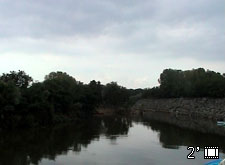Further south, down the road that takes us straight to the Turkish border, we pass Varvara which now has an artist colony and which was, in post-independence Bulgaria, populated mainly by ethnic Turks. After the Balkan Wars (1912-13) these were ‘replaced’ by Bulgarian refugees from Eastern Thrace as the Turks ‘emigrated’ into the remains of the Ottoman Empire.
As we get closer to Rezovo we cross one of these invisible internal borders, a fleeting trace of the communist past, a controlled road block where our passports are checked. We are informed that photographing and filming is not allowed within this zone. It doesn’t feel very real, more like a historical reflex, a hold-over from the previous era but also a marker for a official Bulgarian identity that is still in a state of negotiation. The village itself is high on a dune-covered  headland overlooking the River Rezovo (River Mutludere, looked at, lower, from the other side). This is the border. M immediately engages in conversation with an old man who complains that they are still waiting for electrical repairs – because of a breakdown and lack of spares the current has been supplied at 380 volts for years and they have had to make do. We walk on a little further to the edge of the cliff where the tiny church of St. John the Baptist is perched. There is a rack of bells outside. The altitude above the waves (and the Turkish beaches) means that on a still day or with the right wind, the sound of the bells would carry well into present-day Turkey and certainly as far as the watch tower near the beach and the small settlement behind it. The message is, however, ambiguous since St. John is regarded as a prophet in both Christianity and Islam. headland overlooking the River Rezovo (River Mutludere, looked at, lower, from the other side). This is the border. M immediately engages in conversation with an old man who complains that they are still waiting for electrical repairs – because of a breakdown and lack of spares the current has been supplied at 380 volts for years and they have had to make do. We walk on a little further to the edge of the cliff where the tiny church of St. John the Baptist is perched. There is a rack of bells outside. The altitude above the waves (and the Turkish beaches) means that on a still day or with the right wind, the sound of the bells would carry well into present-day Turkey and certainly as far as the watch tower near the beach and the small settlement behind it. The message is, however, ambiguous since St. John is regarded as a prophet in both Christianity and Islam.
|
|
We walk down to sea level where there is a sign reminding us not to take photographs. Everyone routinely ignores it. As we walk along the stone reinforced river banks, a Turkish fishing boat chugs in from the sea, marking the border in its wake.
Since we arrive back in Primorsko in the early afternoon we decide to play real tourists, to go for a swim and lie on the beach.
|